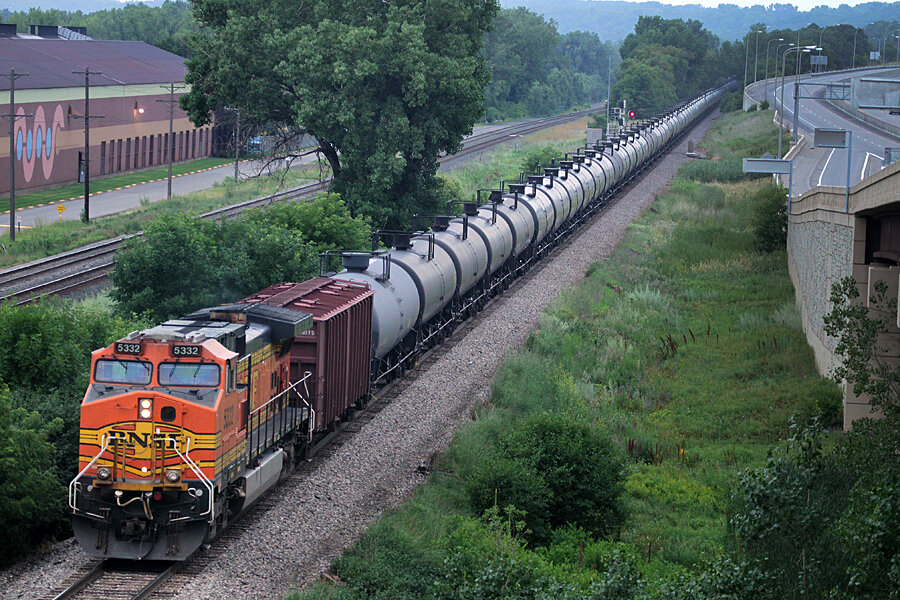Coal shortage? Blame oil trains.
Loading...
The rapid growth in US shipments of crude oil by rail is leading to an unexpected shortage of coal at many power plants across the country.
Shipping crude oil by rail is a relatively recent practice that began out of necessity; the existing pipeline infrastructure in the US wasn’t adequate to handle ballooning domestic oil production levels. Rail companies are now shipping more than 15,000 train carloads of petroleum products each week, more than double the amount in 2010.
Oil shipments originating in North Dakota are competing for rail space with coal coming from Wyoming and Montana, and traversing agricultural states that need space on railcars to ship their farm products.
The result has been delays in shipments of corn, grain, and even coal. Several utilities in the Midwest are watching their coal stockpiles diminish as they burn through inventories, as resupplies come in at a slower and slower pace.
According to the Star Tribune, a Wisconsin utility could be forced to shut down electricity generation this winter because it could run out of coal. Dairyland Power has not been able to replace coal stocks fast enough and could face a critical shortage when the cold sets in.
And it’s not just Wisconsin. Coal stocks at Minnesota utilities are 22 percent below the five-year average. Power plants in places like Kansas, Arkansas, Colorado and Texas have all seen their coal supplies deplete.
The problem is causing some unease. Utilities are cutting back on electricity generation at night to conserve coal.
Xcel Energy and other utilities are putting pressure on rail giant BNSF to increase capacity and relieve pressure on the rails. BNSF spokeswoman Amy McBeth told the Star Tribunethat the problem should improve over time. “Our network has had some significant challenges this year, including historic weather conditions and increased growth in volumes across a number of sectors,” she said. “We continue to see some gradual improvements in service for customers along our Northern tier as new capacity comes online.”
Several members of Congress have written letters to the US Surface Transportation Board (STB) to urge regulators to resolve the situation. The STB has decided to hold public hearings on the problem.
“The Board has been closely monitoring the rail industry's performance metrics and is concerned about service problems across the nation's railroad network, particularly on the Canadian Pacific Railway Company (CP) and BNSF Railway Company (BNSF) systems. The Board Members have written to and met with the leadership of BNSF and CP to discuss these concerns,” the agency said in a press release in April.
BNSF plans on investing more than $5 billion to increase rail capacity, including building new rails, buying new trains, and hiring more workers.
But the problem may not be solved in the short-term. Oil production from the Bakken surpassed 1 million barrels per day in April, and is not expected to slow anytime soon. And about 62 percent of oil coming from the Bakken is shipped by rail. It will take time to build out rail capacity.
And even as the rail industry moves to address delays, the federal government is taking stronger steps to address the disturbing frequency of derailed trains carrying crude oil. A series of high-profile derailments and explosions forced federal transit regulators to rollout new rules.
The Transportation Department has proposed phasing out older rail cars within the next two years and lowering speed limits for trains carrying crude oil. The proposal calls for a speed limit of 50 miles per hour for trains that comply with the new safety standards, and 40 mph for those that do not.
On the one hand, the rules could exacerbate rail traffic by forcing rail companies to focus on upgrading safety rather than increase capacity that would allow greater volume. On the other hand, by raising the cost of transporting crude oil by rail, the new rules could slow oil shipments.
Moving oil by rail already adds $10 to $15 to cost of producing a barrel of oil, triple the cost of moving oil by pipeline. But higher costs could force some drillers to slow production until either oil prices rise or new pipeline capacity comes online. The regulations are projected to cost $6 billion over the next 20 years.
Time will tell how those regulations will impact rail activity, but in the short-term, coal utilities are feeling the pinch, and there is little they can do. Bakken oil production continues to rise. And with the harvest of the nation’s summer and autumn crops now being loaded onto railcars, the competition for space on America’s railways shows no sign of ending.
Source: http://oilprice.com/Energy/Crude-Oil/Oil-by-Rail-Shipments-Cutting-Into-Coal-Deliveries.html







